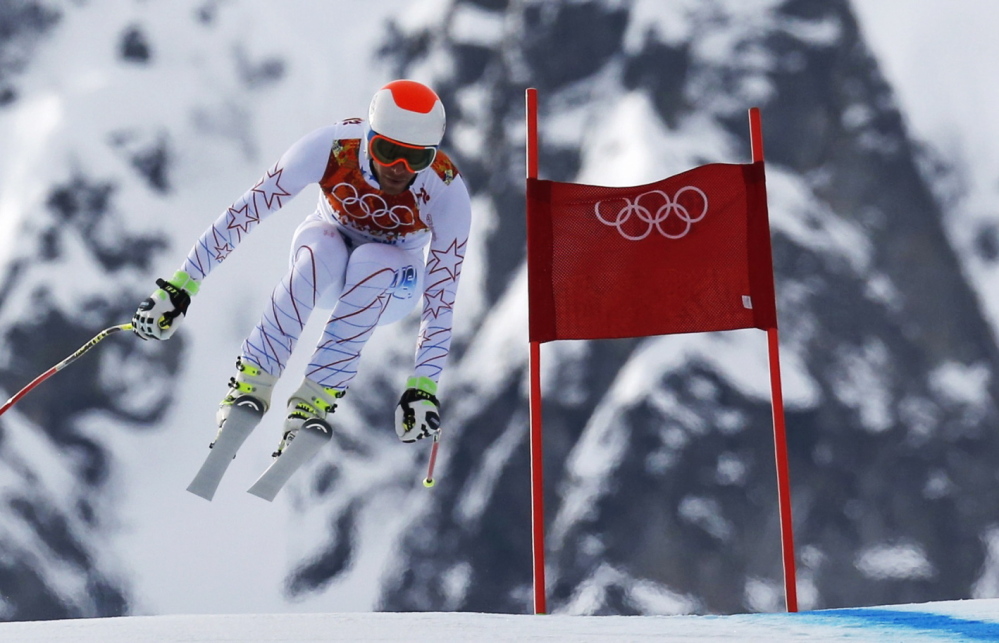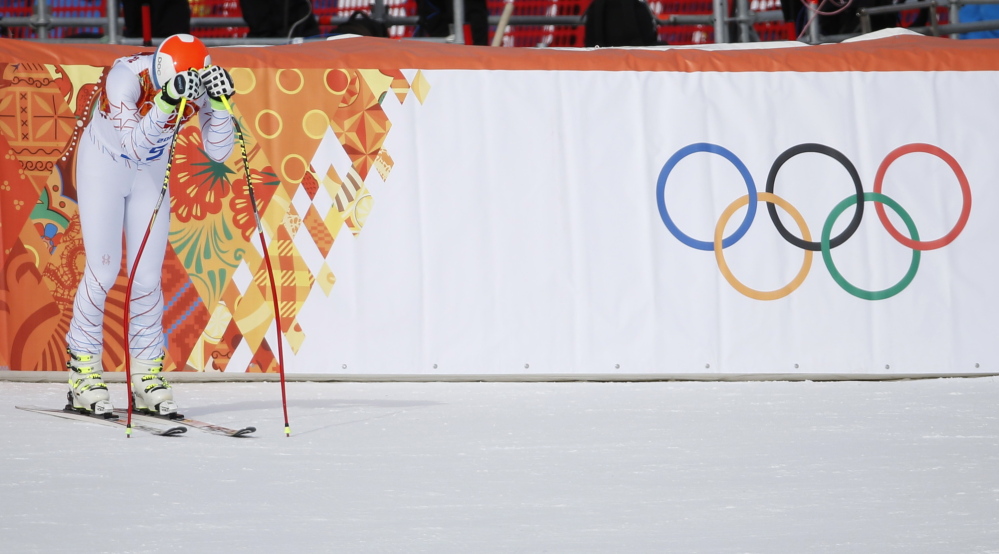KRASNAYA POLYANA, Russia — At the Winter Olympics, the men’s downhill ski race is the big bowl of goulash. The premier attraction. It is spectacular, dangerous, wild, compelling, thrilling and heartbreaking.
At the Winter Olympics, Bode Miller is the puzzling and not easily digestible spice in the bowl of goulash.
But we know the rules, don’t we? As a nation, America cannot go to the Olympics with the Bode Miller it wants. America must go to the Olympics with the Bode Miller it gets. Which can be maddening.
And so it was again Sunday at the Rosa Khutor Alpine Center.
Miller, the New Hampshire native and graduate of Carrabassett Valley Academy in Maine, was the favorite to win the downhill. But after a couple of slight bobbles, he finished a disappointing eighth. Then he seemed to put the blame on the course conditions, the flat sunlight, the humidity and maybe the temperature of Russian concession stand food.
Anything but himself.
For instance, when asked the difference between his superior training runs last week and Sunday’s result, Miller pointed to the atmospheric environment.
“The training runs were bluebird, perfect visibility and hard snow,” Miller said, followed by a rueful chuckle. “That’s the perfect conditions to see who’s the best racer, unfortunately. Today the visibility went away, temperatures are warmer so the course breaks down a little bit. … In the middle where it’s all ice, the high humidity brings the water out and the snow just gets slower.”
Therefore, after reviewing the race in his mind, Miller said he was giving himself an excellent grade for the day.
“It’s tough when you have to judge yourself because the clock doesn’t really seem to judge you fairly,” Miller explained. “Just like I’ve said a million times, I’m not always so attached to the result.”
Not attached to the result? Say what?
Same old Bode. That’s what.
The man is an awesome athlete. Miller is the best American ski racer of the past 20 years and maybe ever. Since his first Games in 1998, he has won five Olympic medals along with 33 World Cup races.
Yet the Olympic downhill – one cannonball scream from top to bottom of the mountain – has been his personal demon. He’s never won it. His best finish was a bronze medal at Vancouver four years ago. For all his greatness, he has been considered an underachiever.
Sunday, that was supposed to change. At age 36 and recently married, he realizes this is surely his last Olympics. And he has supposedly matured after a well-publicized life of partying and world class don’t-give-a-flip impudence. He was focused. He was locked in.
“Bode was unbelievable yesterday in training,” said the man who won the downhill gold, Matthia Mayer of Austria. “Everybody knew Bode could be the Olympics winner today.”
Miller came out of the gate with winning body language. In his dazzling white racing suit, he blitzed down the snowpack – which is really groomed ice – and was ahead of gold medal pace for the first segment of the course. But then he put one ski in a slightly wrong place, by inches. This forced him to lean just slightly off his intended path. He skimmed one of the gates bordering the course with his shoulder as he blew past. Then he skimmed another.
Those minor errors, costing tenths of a second, eliminated gold or any other medal for him. Miller couldn’t make up time in the bottom part of the course and crossed the finish line .52 seconds behind Mayer. Miller was plainly upset when he looked up at the scoreboard and saw his time. He squatted over his skis in the runout area. He stared at the snow. He put his hands on his helmet and stared at the snow some more.
It was an extremely good and amazing effort. Just not quite extremely good and amazing enough. Miller was actually the second best American finisher, behind 25-year-old Travis Ganong, who placed fifth and shows terrific promise for future potential medals.
“Bode had a great run,” said Ganong, a Miller fan as well as a teammate. “He had one mistake on this pretty critical turn that goes into a flat section. If you lose your speed there, it’s just a losing battle to the finish. He crushed the top. He just had one little mistake. That’s why the sport is so hard. It’s unforgiving. There’s such a fine line.”
Exactly. Miller had no cause to be ashamed with his effort. He aggressively rode the edge but made tiny flubs to miss the perfect run by a smidgen. Others were better than him. Period. If Miller owned up to all that, America might unconditionally admire him. But as has been the case before, Miller’s post-race remarks made him hard to embrace.
“I didn’t really make a mistake,” he insisted. “I mean, I hit gates, but as you guys know, hitting gates doesn’t really make any difference. I continued to build pressure. It was just that middle part of the course … The course just slowed down. It’s one of the big challenges in ski racing; sometimes it’s not in your hands.”
Sometimes it’s not. But sometimes, you can also hold yourself responsible for not winning, rather than holding the humidity responsible. His individualism and bluntness can be both his strength and his weakness.
Miller will likely compete twice more here, the Super G and Men’s Combined. But no one over age 34 has ever won a medal in a men’s Olympic Alpine event. Sunday might well have been Bode Miller’s last best chance to become a unanimously venerated American sports icon and ride off into the sunset.
Instead, the sunset was obscured by bad visibility, created by Miller himself. One day, he might wake up and smell the goulash.
Sunday was not that day.
Send questions/comments to the editors.



